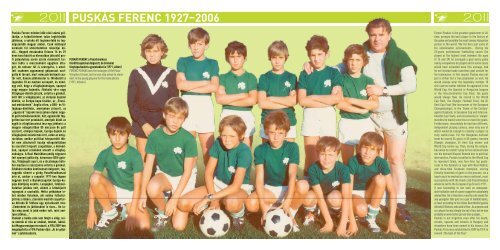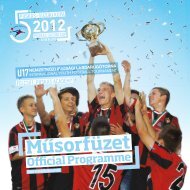A-csoport - Puskás Ferenc Labdarúgó Akadémia
A-csoport - Puskás Ferenc Labdarúgó Akadémia
A-csoport - Puskás Ferenc Labdarúgó Akadémia
Create successful ePaper yourself
Turn your PDF publications into a flip-book with our unique Google optimized e-Paper software.
<strong>Puskás</strong> ferenc minden idők első számú góllövője,<br />
a futballtörténet talán legkitűnőbb<br />
játékosa, a valaha élt legismertebb és legnépszerűbb<br />
magyar ember. Csak néhányat<br />
sorolunk fel utolérhetetlen rekordjai közül…<br />
negyed évszázados (hiszen 16 és 39<br />
éves kora között az élvonalban játszott) profi<br />
pályafutása során szinte mindenütt tartani<br />
tudta a meccsenként egygólos átlagot,<br />
de sokszor túl is szárnyalta, s emellett<br />
csaknem ugyanannyi gólpasszal szolgálta<br />
ki társait, mert nemcsak befejező csatár<br />
volt, hanem játékmester is. Mindenütt a<br />
legendás 10-es mezben szerepelt, és mindegy<br />
volt, hogy a világbajnokságon, spanyol<br />
vagy magyar bajnokin, főiskolai vb-n vagy<br />
Világkupa-döntőn játszik, ontotta a gólokat.<br />
gólt lőtt a világbajnoki, az olimpiai bajnoki<br />
döntőn, az európa-kupa-finálén, az „Évszázad<br />
mérkőzésén“ anglia ellen, a Bek- és Világkupa-döntőkön,<br />
amelyeken játszott, az<br />
„egyszerű“ bajnoki meccseken olykor négyöt<br />
gólt mérkőzésenként. két, egymástól független<br />
karriert produkált, amelyek közül az<br />
egyik is világklasszissá tesz egy játékost: a<br />
magyar válogatottban 85 meccsen 84 gólt<br />
szerzett, olimpiai bajnok, európa-bajnok és<br />
világbajnoki ezüstérmes lett, aztán az emigrációban,<br />
amikor politikai kényszerből többé<br />
nem játszhatott hazája válogatottjában<br />
és szeretett kispesti csapatában, a honvédban,<br />
spanyol színekben utazott a világbajnokságra.<br />
a real Madridban pedig négyszer<br />
lett spanyol gólkirály, háromszor Bek-győztes,<br />
Világkupát nyert, és a dicsőséges hófehér<br />
mezben is százszámra ontotta a gólokat.<br />
edzőként minden kontinensen dolgozott, legnagyobb<br />
sikerét a görög Panathinaikosszal<br />
érte el, amikor a csapatot 1971-ben (éppen<br />
negyven éve!) a Bajnokcsapatok európa-kupája<br />
döntőjéig vezette. Lenyűgöző, felülmúlhatatlan<br />
játékos volt, akinek a futballjáért<br />
rajongtak a szurkolók. Méltó példaképe lehet<br />
minden fiatalnak, aki valaha futballcipőt<br />
húz a lábára. zseniális madridi csapattársa<br />
alfredo Di Stéfano úgy nyilatkozott róla:<br />
„emberként és játékosként is tízes… De talán<br />
még annál is jobb ember volt, mint amilyen<br />
játékos…“<br />
<strong>Puskás</strong>t a halála után sem felejti a világ: sorra<br />
nevezik el róla az utcákat, tereket, iskolákat<br />
Magyarországon és másutt, a fifa 2009-ben<br />
megalapította a fifa <strong>Puskás</strong>-díjat „az év góljának”<br />
a jutalmazására.<br />
puskás ferenc 1927–2006<br />
PUSkáS ferenC a Panathinaikosz<br />
felnőttcsapatával dolgozott, de örömmel<br />
fényképezkedett a gyerekekkel is (1971, athén)<br />
ferenC PUSkáS was the manager of the Panathinaikos<br />
a team, but he was also asked to stand<br />
next to the young players for the team photos<br />
(1971, athens)<br />
ferenc <strong>Puskás</strong> is the greatest goalscorer of all<br />
time, perhaps the best player in the history of<br />
the game and possibly the most famous hungarian<br />
person in the world. we list here just some of<br />
his unbelievable achievements... During his<br />
23-years professional footballing career (he<br />
played at the highest level between the ages<br />
of 16 and 39) he averaged a goal every game<br />
nearly everywhere he played and in some cases<br />
would have exceeded even this average, had<br />
he not instead made countless goal assists for<br />
his teammates. in this respect <strong>Puskás</strong> was not<br />
just a striker but a true playmaker as well. he<br />
would always wear the legendary number 10<br />
shirt and no matter whether he appeared in the<br />
world Cup, the Spanish or hungarian leagues<br />
or the intercontinental Cup final, the goals<br />
would always flow. he scored in the world<br />
Cup final, the olympic football final, the Dr<br />
gerő Cup final (the forerunner of the european<br />
Championships), in the ‘game of the Century’<br />
against england, in european Cup and intercontinental<br />
Cup finals, and occasionally in ‘simple’<br />
matches he would score four or even five goals.<br />
furthermore, remarkably he had two different,<br />
independent playing careers, even only one of<br />
which would be enough to classify a player as<br />
truly world-class. for the hungarian national<br />
team he scored 84 goals in 85 games, became<br />
olympic champion, Dr gerő Cup winner and<br />
world Cup runner-up. then, during his emigration<br />
when he couldn’t play for his national team<br />
nor his beloved kispest honvéd due to political<br />
intervention, <strong>Puskás</strong> travelled to the world Cup<br />
to represent Spain, was four-time top goalscorer<br />
in the Spanish La Liga with real Madrid,<br />
and three-time european champion, scoring<br />
literally hundreds of goals in the process. as a<br />
head coach he worked on every continent, most<br />
successfully with the greek club Panathinaikos<br />
whom he led to the european Cup final in 1971.<br />
it was fascinating to see such an unsurpassable<br />
footballer and of course supporters absolutely<br />
adored him. he is therefore a worthy role model for<br />
any youngster that puts on a pair of football boots,<br />
at least according to his fellow real Madrid genius<br />
alfredo Di Stefano, who said of him „as a person and<br />
as a player he was simply ten out of ten, but he was<br />
probably an even better person than a player...”<br />
<strong>Puskás</strong> is not forgotten even after his death;<br />
streets, squares and schools in hungary and<br />
elsewhere have been named in his honour, the<br />
<strong>Puskás</strong> Prize was established in 2009 by fifa to<br />
reward ‚the goal of the year’.




